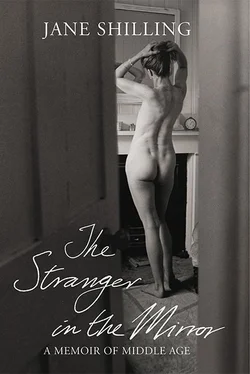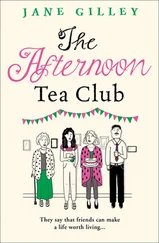He was almost as hesitant about his own shift towards the next stage of life as I was about mine. He’d been impatient for a while with the nursery atmosphere and restrictions of Linda’s regime; surlily rejecting her insistence on good manners; her efforts to steer him towards assuming some of the responsibilities of the ante-room to adulthood. But while he resented the nursery, he was reluctant to leave behind the privileges of childhood.
We were both worried about what life would be like when Linda left. For twelve years we had been alone together only at weekends and holidays. If something went wrong, if we had a row or got bored, we were never more than a few days away from her mediating presence. What’s more, the regular passage from Linda’s care and Linda’s house to mine made us seem exotic to each other: at the end of the school day I would feel a clutch of excitement at the sound of her car drawing up outside the house, the slam of the door, the footsteps up the path, the prospect of the day’s news to come.
Weekends and the planning of how to spend our two days of freedom – where should we go, what should we do? – felt like a succession of small holidays. But I doubted my ability to sustain the variety, the imaginative energy, even as far as the end of the summer holidays, never mind indefinitely – or at least for the next four or five years, until the moment when he would (presumably) leave home.
I thought my nervousness about the future would make us uneasy with each other. That we would say our farewell and turn away with the hollow sense of people left behind, returning to our empty house after waving Linda and the girls off on their adventure. Linda and I, as we parted, couldn’t speak. Our throats were full of dry sobs that we couldn’t swallow. I had expected that Alexander would be desolate; that I’d have to control my own feelings in order to take care of him, but as we turned for home it was I who wept and he who seemed to take charge.
The combination of perimenopause and adolescence should have been volatile, but perhaps the long expanse of July and August was the right moment for the tidal shift of boundaries between child and parent. There was an unexpected companionable lightness to those summer months. It felt carefree, like sharing a house with a friend. The vapid sense of boredom I feared never came. I thought it would be impossible to work with another person in the house, wandering in and out for a chat, filling the house with noise, dirty plates, discarded socks and dense clouds of teenage languor. But we fell into a routine. The weather was fine, the days long. I got up early and worked. We ate lunch together and went out in the afternoons.
In August we went to Crete, where we stayed for a week in a stone house on a hillside with olive groves sloping away towards the lights of the valley. In the early evening swallows skimmed the pool, swooping to sip a few drops, circling and swooping to sip again. As it grew dark we lay flat on the stone terrace and watched the stars come out and the bats hunting overhead. I would have been happy to stay among the olive groves, the singing heat, the birds curving over the pool, the stars and the bats, but Alexander wanted to explore, so on the third day we drove to a Venetian port, 30 kilometres away.
The drive in the crammed streets of the little town was strident by comparison with the archaic peace of the house on the hillside: the one-way system convoluted; the traffic signs few and unexpectedly placed, issuing instructions in Greek that I couldn’t transliterate fast enough to obey. We circled the suburbs fretfully before finding at last the route to the port. There we left the car and struck in from the city walls to the centre. A maze of narrow alleys between old stone houses opened into a starburst junction of wide thoroughfares roaring with cars, at the centre of which stood a cruciform covered market.
Stepping away from the hot shimmer of the traffic into the cool shade of the stone market building, with stalls in every direction piled with onions, tomatoes, aubergines, bundles of green herbs, hard quoits of bread sprinkled with seeds, buttermilk pucks of sheep’s cheese, chunks of honeycomb bleeding gold, glinting scales of little silvery fish and the writhing purple arms and large reproachful eyes of octopus, the dreamy idleness of the past few days by the pool gave way to an avid longing to try all these new things. The violet artichokes, the waxy slabs of olive oil soap, the creamy blocks of halva jewelled with pistachios and powdery mounds of rose and lemon Turkish delight – I wanted them all.
More exactly, it wasn’t the things themselves that I wanted, not the tourist’s experience of asking for things in dumb show, fumbling for a handful of unfamiliar coins and carrying home my little trophy of local colour. I wanted to know what it felt like to be one of the plump housewives with their straw baskets, bantering with the stallholders as they assembled the ingredients for the day’s meals.
Alexander, who didn’t altogether share my passion for the groceries of other nations, was growing restive. On the way to the market, in the cutpurse maze of little streets, we had passed plenty of restaurants: appetising, some of them, with white walls, bright blue or dull green paintwork and dim tiled interiors exhaling cool air into the hot street.
We’d noted a couple of them to go back to, but now I had another idea. Among the market stalls were several cafes – narrow diners consisting of a single line of tables flanking a counter with a display of hot dishes – mysterious stews with sharp-angled fins and knobbly joints rising like wrecks from a choppy sea of ochre liquid; sandy heaps of fried dabs, orange loops of stewed squid. It was past noon and the diners were filling up with shoppers and stallholders.
‘We could eat here, in one of these cafes,’ I said. ‘Those restaurants we saw are for tourists. This is where the market people eat.’
‘But we are tourists,’ said Alexander, looking unhappily at a writhing tentacle beckoning from a seething cauldron of crimson broth, ‘and I fancied a pizza.’
‘This is Crete, not Italy,’ I said. ‘And what’s the point of visiting a place if you don’t eat the food? I’m sure you could find something nice to eat in one of these cafes. You quite like squid, don’t you?’
‘Not this sort of squid,’ said Alexander, firmly.
There rose in me suddenly a rage as urgent and vivid as love. I opened my mouth and incoherent shouting came out: ‘I brought you on this holiday,’ I screamed. ‘I did all the work. I found the house and paid for it. I did all the packing and the driving and you didn’t lift a finger to help. I’ve done all the shopping and cooked all the meals and we have to eat indoors because you’re frightened of bloody wasps and now I can’t even eat in the restaurant I want to because you won’t put anything in your mouth that isn’t pizza. I never get to do anything I want, because you won’t let me. It’s not fair .’
I paused for breath. Alexander was staring at the ground. A vivid, childish sense of injustice had given me a mad energy. But as I drew breath to carry on shouting, the energy leaked away and I subsided into bitter martydom. ‘Fine,’ I said. ‘You win. Pizza it is. In the tourist restaurant. Why not?’ And I set off at furious speed, marching back the way we had come, my son trailing dismally behind.
As I stamped my rage into the old paving stones a memory flashed into my mind, of a summer holiday in France with my parents when I was my son’s age. It was lunchtime and something had gone wrong. We had meant to buy a picnic but it was half-day closing and the shops were shut. Instead of heading for the nearest bistro, my father had turned off the car ignition in the middle of nowhere and refused to move. We all sat there, raging, powerless and silent, staring out of the windows at the empty road, the pointless expanse of countryside, the wild flowers and hopping birds and chirping insects all getting on with their lives while we were stuck there in angry limbo. I couldn’t remember the end of the story, only my sense of impotent fury and contempt that this grown man, this parent , was behaving like a stupid child because he hadn’t got his way over a picnic.
Читать дальше












